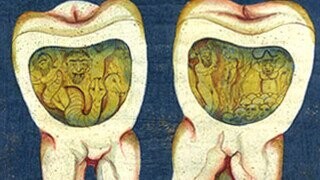People Used To Blame Cavities On Evil Tooth Worms

We asked readers what modern convenience makes them thankful they weren't alive centuries ago. Quite a few people praised indoor plumbing. Katie P. shrinks at the thought and having to aim into a bucket with her gastrointestinal issues, and "From what I understand," says Josh T., "clean water systems and garbage disposal are the real reason expected human lifespans shot up so dramatically in the 20th century." Air conditioning was another popular answer. "Walking to an outhouse is not hard to do," says Steve P. "Would you rather have indoor plumbing over heat when it is -25° or A/C when you are trying to sleep in 105° humid weather?"
Of course, a lot of people appreciate modern medicine. "Vaccinations, full stop," from Nick P. was the top-voted answer, while Libby B. says, "Insulin and my insulin pump. Centuries ago, I'd be dead." Modern dentistry, in particular, is a lifesaver. "I would have died from sepsis without it," says Susannah B. "Got a tooth pulled last week and no pain or soreness during the extraction or after," says George T.
Dentistry really is an old science, older than most fields of medicine, and when you go back thousands of years, it was perhaps more advanced than you'd expect. But it was still primitive in many ways, especially when it came to the science behind tooth decay. Many people around the world blamed cavities on some unseen "tooth worm." Unconnected cultures came up with this explanation independently, starting in 5000 B.C. in Mesopotamia and continuing into the Middle Ages.
Don't Miss
Considering that tooth decay really is caused by an organism (bacteria, which eat sugar and produce acid), the worm theory might sound pretty close to the truth. This was about as close as they could get to the truth in the Middle Ages because they didn't know about germs back then. They did know about parasites, though. It was perfectly normal back then for, say, two neighbors to sit in the sun and talk unashamed while their daughters attacked the lice in the men's hair with ointments and fine-toothed combs.
The only problem with the worm theory was when the time came to treat the infestation. Dentists would squeeze onion juice into a patient's ears, to repel the worms and make them slip out through the teeth. And to attract the worms on the other end, dentists would apply honey to the rotting tooth's surface. It seems unlikely that this improved the patient's dental health.
No one ever saw the worms crawl out of the teeth, confirming the belief, but they did see what they considered evidence. Dentists, probing a decaying tooth, would sometimes come upon something long and stringy and would extract it. This was the tooth's nerve, and removing it did not at all improve the tooth's health, but it did tend to provide some pain relief for the suffering patient.
This fact came from the One Cracked Fact newsletter. Want more like this, straight from your email inbox, without any ads or popups? Join here:
For more ancient dentistry, check out:
Dentistry Was Disgusting In Every Possible Way
We Need Dentists and Braces Because We Evolved Big Brains
Your Teeth Might Have Exploded In The 19th Century
Follow Ryan Menezes on Twitter for more stuff no one should see.
Top image via Wiki Commons
